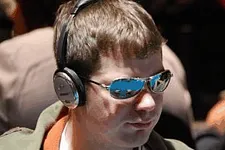Inside The Poker Tour – 78 Show And Tell

Howard Lederer never seems to tire of saying that poker is a game of imperfect information—and I have to agree with him. We live in an information age, so why can't players just throw their hands away and go on to the next hand? Amazingly, at least to me, players show hand after hand, to their opponent. Let's examine that. What would the purpose be, if there is one? If you're a tight player do you want to show bluffs, when you make them? Is it your hope to get paid off when you make a hand? Well I have some news for you, the game passed you by whilst you were in the kitchen making a sandwich. If you're a maniac do you want to show that you can out maniac another maniac? Is this like being in a drinking contest where you hope to be the first one that gets sick? I frankly don't get it. Maybe someone can explain this to me?
The one player that apparently could pull this off was the now deceased Billy Duarte. His simple explanation, after declaring that he would always show his hand when asked about it after the hand was over, was that the same situation would never come up twice. Well, that may be technically correct, but knowing that a player is capable of making a bluff on the river, or not, is huge all by itself.
Another habit that many players are fond of, is apparently giving lessons to weaker players at the table. Why? If your opponent has made a mistake, why does one feel the need to educate them? Is it so that they won't make the same mistake the next time they are in that situation? The only reason I can see for this behavior is having an ego so huge that you can't keep your mouth shut. The other possibility is that your hormones are out of control—perhaps you have testosterone surging through your veins and arteries and you just have to say something? I can't imagine it's done out of altruism Do you really hope that your opponent will play better the next time? Of course these petty outbursts most often happen when one takes a bad beat. Often they happen on the neutral, anonymous, screen of the computer, where childish behavior is common.
I need to acknowledge legitimate actions based on legitimate analysis here. The only player that I know of that can consistently pull this off is Daniel Negreanu. He thinks out loud. Maybe that is the way he is wired. It certainly makes for great television. Even he has made an occasional verbal slip giving away information about his hand, or his dilemma, when there is another round of betting. I remember doing a television show with him where he held KT, likely the first GSN real money game show at the Golden Nugget in Las Vegas, where Antonio Esfandiari was on his left, perhaps in the little blind, with JJ and the flop being QTx, and Daniel had made a largish bet and Antonio was about to throw his hand away and Daniel got carried away with winning this hand, in his own gleefulness in the situation started talking about what he thought Antonio had. Whoops, Antonio pulled his thought away from being beat and made a tough call. Daniel knew he had blundered, and even remarked on it, after losing this hand.
Freddy Deeb is the other player that most often is capable of giving honest analysis, and often making the right read and play based on it. "Why did you bet so much?" he might ask his opponent. Nonetheless I don't recommend trying this, even great and professional players make mistakes when they talk at the table—I have witnessed it many a time.
One guy who gains a lot of information by asking opponents what they have is Erick Lindgren. He seems to be able to do this without giving away much information about his own hand.
The all-time classic, and my personal favorite, happened at a Borgata WPT event where John D'Agostino mixed it up with Michael "the Grinder" Mizrachi. John raised it from UTG with KK and Michael called with two small hearts from the big blind. The flop brought Axx with two hearts (I haven't found this hand on tape anywhere, so can't give a precise description or quotes) and the Grinder checks, with Jdags betting, and the Grinder moving all-in. Now Jdags jumps out of his chair and starts asking the Grinder some questions. First he states that "I know you have a flush draw." "The question is, do you have an ace with it?" As time goes by Grinder begins to expect to win, and loosens up a bit. Big mistake! Now Jdags says, "The problem is that you're so lucky that you're likely to make the flush anyways." Grinder agrees, and Jdags calls instantly. Instantly! After which he won. I asked John about this hand many months later, and he said that he was pretty sure that Grinder did not have an ace and that he was going to have to call… If so, that takes some of my illustrative value away, but after-the-fact we all "know".
Until next time, play good and get lucky!












